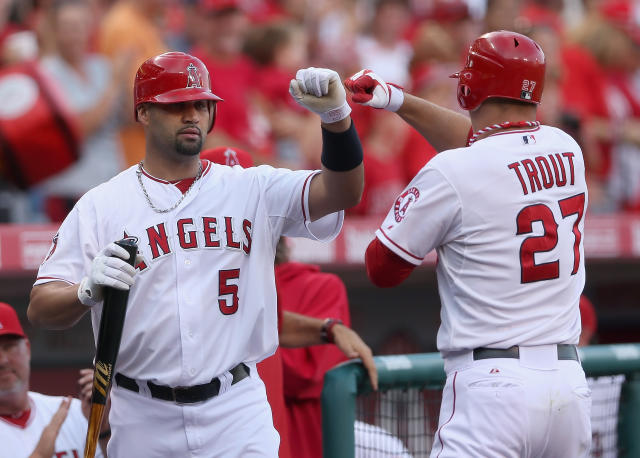Figuring out Mike Trout's next big contract: $100M, $250M or $300M?
Inside the Los Angeles Angels clubhouse on payday next year, there are truths. Like the 33-year-old first baseman with nine years left on his $240 million contract. Nearby is the guy hitting behind him, in the first year of a $125 million deal. Which is not to be outdone by the fifth outfielder who may get 10 plate appearances a month fetching a bigger check than anyone, $24.6 million for the season.

And over there sits the best player in baseball, not even making a million bucks.
Such is life in the major leagues, where the first three years of a player's career amount to forced poverty, at least by professional sporting standards. Surely Mike Trout can survive on a paltry $900,000 or so while Albert Pujols, Josh Hamilton and Vernon Wells, respectively, do rich-people things like donate $2 million to charity.
Well, what if Trout wants to give away a bunch of money – or, at least, get a Black Card? If the Angels are willing to lavish others with nine-figure deals, surely they could find it in their budget to do the same for the 21-year-old AL MVP runner-up.
It's not happening – not at the moment, two sources confirmed – but the idea of a Mike Trout contract extension is far from far-fetched. In a game where Evan Longoria signed away nine years of his career before a single major-league pitch, the opportunity to lock up young talent is palpable. And with that, and Trout's once-in-a-generation talent in mind, Yahoo! Sports went about figuring out the perfect contract for Trout and the Angels.
[Related: A's new shortstop calls GM Billy Beane 'extremely sexy and cool']
No need for Angels GM Jerry Dipoto to thank us. Trout's agent, Craig Landis, need not kick over a vig on his 5 percent fee. For this, we consulted experts around the game – executives, agents and players, who could give perspective on all sides of the negotiating triangle. What's good for the player isn't always for the club, and vice versa, and the agent often causes another layer of confusion. This deal is meant to be amenable for everyone: long and rich enough to satiate Trout and reasonable and rational enough to placate the Angels.
While they'd love to pattern the Longoria deal, Trout would not settle for anything near that. And because Trout doesn't reach free agency for another five years, the Angels won't be compelled to pay him like one. So rather than picking a number and dollar value together, perhaps it's best to split them up and reunite them toward the end of the process.
Let's first look at the years. The executives, told to be reasonable, shied away from the 15-year offers they would lean toward for a player of Trout's caliber. They weighed Trout's free agency after the 2017 season – he would spend most of that season as a 25-year-old and cause a frenzy at 26 – with the Angels' desires to lock in his best years.
"If I were him, I'd try to do a nine-year contract," said an AL general manager. "Good for him, good for the Angels. Five years, four free-agent years."
Well, good for the Angels at least. Agents heard the suggestion of nine-year deals and scoffed.
"Just go year to year," one agent said, and it was probably the least-surprising comment in this whole exercise. Of course an agent wants Trout hitting the market at 26. If he continues to play in the manner he did last season – and while that level may prove an impossible standard, Trout, at very least, should be among the game's best – Trout would have a reasonable case to become the first $300 million player. If Hamilton is getting $32 million in each of the last two years of his contract in his age-35 and -36 seasons, surely one of the game's best players could fetch that with most of a 10-year contract throughout his prime.
There is compromise here, and it is likely somewhere near the midway point between his free agency and the nine-year deal.
"If you're the Angels, you don't do the deal without getting at least two years [of free agency]," another AL executive said. "If you're Trout, if you give up two years, you're still a free agent at 28. If you can guarantee yourself $100 million now, are you telling me you don't do it?"
Ahhhh. And there it is. The dollar figure. This is where it gets fun.
[Related: Propsect in Mets' R.A. Dickey trade uses gay slur on Twitter]
Here is the proposed money from executives: $60 million, $90 million, $100 million, $110 million, $112 million, $137 million.
And from agents: $100 million, $130 million, $180 million, $250 million.
Players: $130 million, $150 million.
Start at the low end.
"As great as he is," the National League GM said, "I feel like $60 million over seven years."
Absurd though that may seem, the record for a player with one year of service time is Ryan Braun's eight-year, $45 million deal following the 2007 season. So the idea of doubling it – or even tripling it – sounded wrong to the GM.
It's one year. One. Do it again.
Of course, the danger in that is Trout does it again and brings himself that much closer to free agency. That's why one executive took out a piece of scratch paper, started muttering to himself and came up with this offer: nine years, $137 million. Pretty nice for a kid who four months ago sipped his first legal drink. Here is the math:
Year 1: $1 million – a huge number for a pre-arbitration player, who, under normal circumstances, would get near the $500,000 league minimum.
Year 2: $1 million.
Year 3: $10 million – his first arbitration season, the point at which ballplayers start getting paid based on production and past precedent.
Year 4: $15 million.
Year 5: $20 million.
Year 6: $20 million – What would be his first free-agent season.
Year 7: $20 million.
Year 8: $25 million.
Year 9: $25 million.
It works out to buying out his first four years of free agency – ages 26, 27, 28 and 29, the tail end of his ultraprime – for $90 million. Considering today a past-his-prime Hamilton went for $125 million over five, that's a tough sell.

Also, let's consider the deal Pujols signed before his first arbitration contract. It's the earliest a player has been guaranteed nine figures – after his third season. The seven-year, $100 million, which included a $16 million option the St. Louis Cardinals exercised, turned into one of the great bargains of this generation, a marvel considering the level of investment – of worry over chronic injuries and guaranteed baseball contracts, of fear that a player could get entangled in drugs or alcohol or PEDs, of the many number of pitfalls professional athletics entail.
Take the arbitration years off the executive's contract, and it's similar to Pujols', only with a $135 million payday as opposed to $100 million. And yet baseball's salary has averaged 4.75 percent annual growth since 2004. Which means when factoring in inflation, Pujols' deal today is actually worth $138.4 million – more than Trout would receive.
If seven for $100 million was under market then, you've got to think nine for $137 million is just as suspect. Still, that was the top-end number thrown out by executives, so it would take a very convincing argument to change their minds.
[Related: Dale Murphy's HOF bid gets animated support]
Remember: Pujols had three years of Pujolsian production to buoy his nine-figure bid. Braun tore the NL up his rookie season. As special as Trout is, other marvels have existed before him, and their triumphs didn't necessarily translate into cash like the 10-year, $250 million deal one agent said he would offer.
The monetary threshold seems to be simple.
"Gotta get nine figures," one player said.
"He's dumb if he agrees for anything less than $100 mil," the other said.
"If he's getting over $100 million on his first bite of the apple," one executive said, "he'd be crazy not to."
So we've got seven years.
We've got $100 million.
"Too much money," an executive said.
"Too many years," an agent said.
In other words, perfect.
This is a monster amount of risk for the Angels, particularly since if they went year to year with him, the most he could earn in arbitration would be somewhere in the neighborhood of $50 million. This deal is saying he is going to play at a truly high level for more than half a decade, and that his first two free-agent years are going to be of remarkable value. Actually, that seems reasonable.
Trout, on the other hand, is giving up the allure of free agency at 26 and the chance of inspiring a bidding war. In fact, to make it even more worth the Angels' while, it's fair to add a club option at a significant salary. In exchange, the Angels would give Trout a huge signing bonus and front-load the contract to avoid some of the upper-bracket taxes sure to be increased in coming years.
Here is the proposed breakdown:
Signing bonus: $10 million.
Year 1: $4 million.
Year 2: $6 million.
Year 3: $8 million.
Year 4: $12 million.
Year 5: $16 million.
Year 6: $18 million.
Year 7: $20 million.
Year 8: $34 million, with a $6 million buyout.
This is the perfect contract. If the Angels decline the option, it is a seven-year, $100 million deal. If they pick it up, it's an eight-year, $128 million deal.
When pondering this exercise, one executive suggested about an 80 percent premium on a contract like this because of all the risks involved. Take a look at Matt Kemp's deal. He signed it a little more than a year ago, eight years and $160 million. It would cover his age-27 through -34 seasons – the back end of his prime. It was considered somewhat under market though fair enough for a player coming off what should've been an MVP season.
Eighty percent of Kemp's eight-year deal is $128 million.
Certainly Trout's deal would include various bonuses: MVP, playoff-series MVP, stolen-base crowns, batting titles, Gold Gloves and all of the other things in which his name will be carved eventually. Even if that takes the value toward $135 million, it will mean the deal was well worth it – that Trout is theirs through his 29th birthday, and he'll be able to donate however much he wants to whomever he wants.
Question now is: Who makes the first move? Every agent in the industry is trying to poach Trout and possibly cash in, even though his family is very close with Landis, so there is that fear on the agent's side. And as much as Dipoto runs the organization day to day, owner Arte Moreno is the one who opens the gilded gates to his checkbook.
The only certainty is that this conversation will happen, and when it does, the sides will dig down for a most unique negotiation. A player who could set records on the field giving up years of control. A team that developed a star and wants desperately to keep him.
And a contract that can't afford to be anything but perfect.
Outside the Game from Yahoo! Sports:
Other popular content on the Yahoo! network:
• Giants' Victor Cruz visits family of Sandy Hook victim Jack Pinto
• Bulls' Joakim Noah ends 'air guns' pantomime
• Gary Andersen leaves Utah State to become Wisconsin's next coach
• Trending Now: Blind surfer conquers Banzai Pipeline
